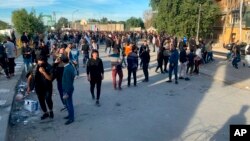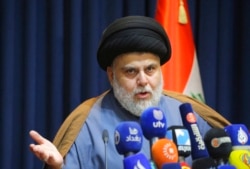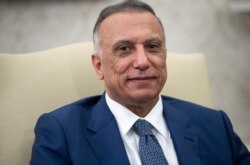Iran, the United States and Gulf Arab states are increasingly engaged in a struggle over the future of Iraq, analysts say. The question that looms over 2022, they believe, is whether the emerging Iraqi political makeup following October’s parliamentary elections will be able to advance Iraqi sovereignty in the context of this geopolitical tug of war.
Marking Iraq’s centenary celebration on December 11, Prime Minister Mustafa Al-Kadhimi urged all Iraqis to recognize what unites, rather than what divides, them for the sake of Iraq’s common good. The country’s federal court is expected to uphold the October parliamentary election results, praised by Iraqi and international observers, despite repeated efforts by defeated pro-Iranian Shiite parties who want them annulled.
Their representation has dropped significantly to some 17 seats compared with Shiite cleric Muqtada al-Sadr’s party with 74. Writing in the Al-Monitor website, Iraqi observer Omar Sattar said Sadr wants “to form a majority government opposing all foreign interference and to disarm militias. The pro-Iran forces are countering Sadr’s aspirations by taking to the street, threatening civil peace, and working to annul the election results. Reaching a middle ground could take a long time.”
Elections were held early in response to mass protests against the government in 2019, but there are concerns about powerful armed groups, many linked to Iran, that still hold sway. There have been no arrests or charges following a failed assassination attempt on Al-Kadhimi in November.
Senior analyst Nicholas Heras with the Newlines Institute in Washington tells VOA that Iraq is at a crossroads and its sovereignty is at stake.
"Fundamentally it will require Iraqi leaders working across Iraqi society to try to build bridges among communities in Iraq that have very difficult experience of living together, both under Saddam Hussein and in the wake of his regime," said Heras. "That is going to be a challenge and that is the great existential question for Iraq as Iraq is in process of becoming a failed state divided along its various regions, dominated by various different identity communities.”
Observers say that Al-Kadhimi has been a moderating force for Iraq and has tried to draw Iraq back into the Arab fold through economic deals with Jordan and Egypt while mediating between regional rivals, Saudi Arabia and Iran. Osama Al Sharif, a Middle East political commentator in Amman, called these moves “anathema to the pro-Iran proxies.”
Meanwhile, as 2021 drew to a close, U.S.-led coalition forces ended their combat mission in Iraq this month, transferring some 2,500 troops combatting Islamic State into a training and advising role. But observers say Iran wants the U.S. out of Iraq. Nicholas Heras.
"Al Kadhimi is viewed as a symbol of U.S. support in Iraq. And so, what we are seeing now is this end zone conflict that is emerging in Iraq whereby Iran is trying to keep activities that its proxies use under a threshold of escalation that would prevent a strong U.S. or for that matter Al-Kadhimi-backed response," said Heras.
Osama Al Sharif, writing in the Saudi Arab News daily, said election winner “Muqtada Al-Sadr has praised Prime Minister Mustafa Al-Kadhimi’s efforts to keep Iraq neutral in the U.S.-Iran showdown.”
He said Al-Sadr may even keep Al-Kadhimi on as prime minister, “even if this is anathema to his Shiite rivals. This would be a major step forward for Iraq, which is trying to revive its national identity and rejoin the Arab fold.”
“If Al-Sadr succeeds in toppling the ethno-sectarian system,” he says, “it will be a historic milestone in the country’s recovery, but his failure could be disastrous on all fronts.”






